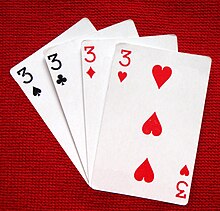
In card games, a set or group is a scoring combination consisting of multiple playing cards, usually of the same rank. Depending on the game, a set may consist of two cards of equal rank (a "pair") as in Bieten, three of a kind as in poker, or more.
Description
Sets are one of the two types of meld that may be used in games where melding is part of the play; the other being a run or sequence. A set or group comprises 3 or 4 cards of the same rank and, usually, different suits. A prial, pair royal, gleek or triplet is a set of 3 cards of equal rank and a quartet or, in some older games, a mournival, is one of four cards of the same rank.
Usually a pair (2 cards of the same rank but different suits) is not counted as a "set"; but some games, such as Bieten or Perlaggen do include pairs as sets. A wild set is one containing wild cards – that is, those cards designated in the rules as being wild, for example, the jokers in Rommé. On the other hand, a natural set is one consisting entirely of 'natural cards'.
In Texas Holdem poker, a set refers to a three of a kind where the player has a pocket pair. This is contrasted with trips which is when a player only has one hole card that matches with two board cards.
Examples
French suited cards
| Pair (may not count as a set) |
 
|
|---|---|
| Prial or triplet |   
|
| Wild triplet |   
|
| Quartet |    
|
German suited cards
| Pair (may not count as a set) |
 
|
|---|---|
| Prial or triplet |   
|
| Quartet |    
|
See also
References
- Parlett (2008) p. 489.
- Parlett (2008), pp. 287, 645.
- Parlett, David. A History of Card Games. Oxford: OUP (1991), p. 127. ISBN 0-19-282905-X.
Bibliography
- Parlett, David. The Penguin Book of Card Games. London: Penguin (2008). ISBN 978-0-141-03787-5.
This card game–related article is a stub. You can help Misplaced Pages by expanding it. |